Inspiring journey of Poobalan “Les” Govender: a life dedicated to community and public service
"I enjoyed going to school, but it was mainly for the delicious hot cup of cocoa and jam on brown bread sandwiches"
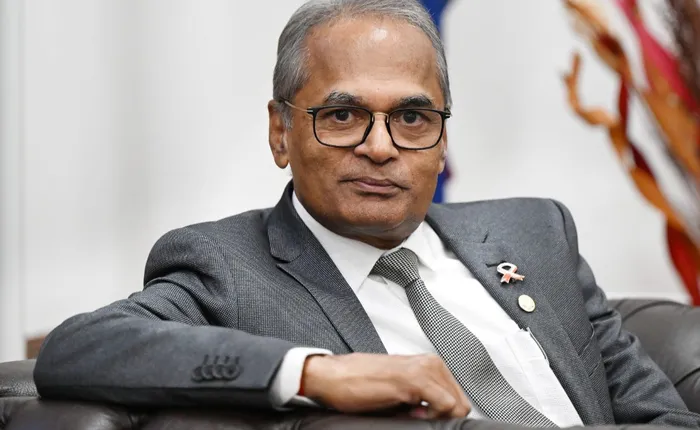
Poobalan “Les” Govender was appointed as the deputy chairperson of the National Council of Province in July last year.
Image: Supplied
FROM serving the community of Chatsworth from a young age, and now serving the country as the deputy chairperson of the National Council of Provinces (NCOP), Poobalan “Les” Govender’s remarkable life story emerges as a testament to resilience and unwavering dedication.
Govender, who will turn 71 on November 21, shared his story which started from humble beginnings growing up in Cato Manor and Chatsworth.
Childhood
Looking back at his family’s history, Govender said his maternal grandfather, Sadayappen Govender, who hailed from Salem in Tamil Nadu, South India, came to South Africa as an indentured labourer at age 15.
“My grandfather worked on a sugar estate north of Durban, where he saved money and later bought a small farm in Northdene. He was quite a religious man, so he built the first temple and a community hall. I was told he travelled four times by ship to India and brought back religious artefacts.
“All activities were centred around the temple and hall. People arrived from other areas such as Shallcross, Malvern and Roosfontein for the big prayers, weddings and birthday parties, among other events,” he said.
He said his mother, Mariamma Govender, who was a housewife and later had a small business doing bridal hair and floral arrangements, married his father, Marimuthu Govender, a cutter for a printing company, and moved to Stella Hill in Cato Manor.
He said this was where he and his elder sister, Sandra Nadasen, were born.
“We lived on a small farm with my paternal grandparents, three uncles and their families. We had a wonderful childhood as we could run around and play freely. I used to play soccer with my cousins. We made a ball using newspaper and wrapped it in plastic. There was a river in which we used to swim and catch fish, which we released. We also used to climb the trees and pick mangoes.”
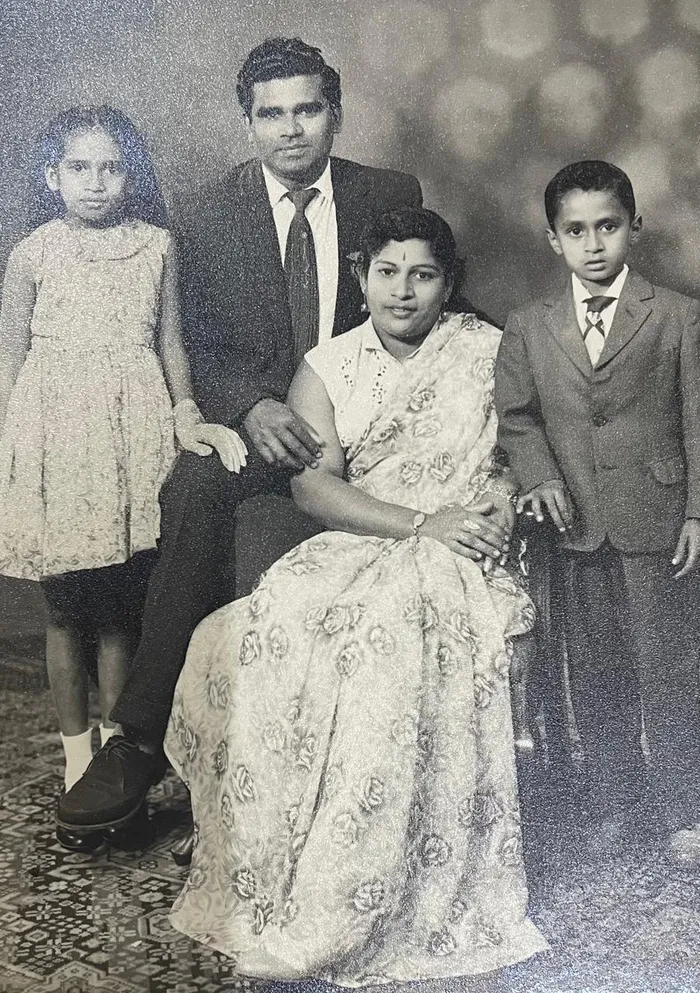
With his parents, Marimuthu and Mariamma Govender, and eldest sister, Sandra Nadasen.
Image: Supplied
Education
He attended Class 1 (Grade 1) at Stella Hill State-Aided School from age six.
“I remember one of the school buildings was made of blocks, but the rest were wood-and-iron. We didn’t have any sporting facilities, but we still played soccer and cricket using makeshift equipment. I enjoyed going to school, but it was mainly for the delicious hot cup of cocoa and jam on brown bread sandwiches that we were given every day. However, my mother always gave us lunch, so I ate both.”
He said while in the middle of Standard 2 (Grade 4), the family had to move to Bayview due to the Group Areas Act. Bayview back then was known as Unit Two.
“We were among the first families that were moved. There were only two schools in Bayview at the time, and they were both at full capacity. My sister and I had to attend the Bharathi State-Aided Primary School in Silverglen. We used to take a bus and jump off along the Higginson Highway and walk for about 20 minutes. If we missed the bus in the afternoons, we had to walk home, which was quite the distance.”
He thereafter attended Chatsworth High School from Standard 6 (Grade 8) and matriculated in 1972.
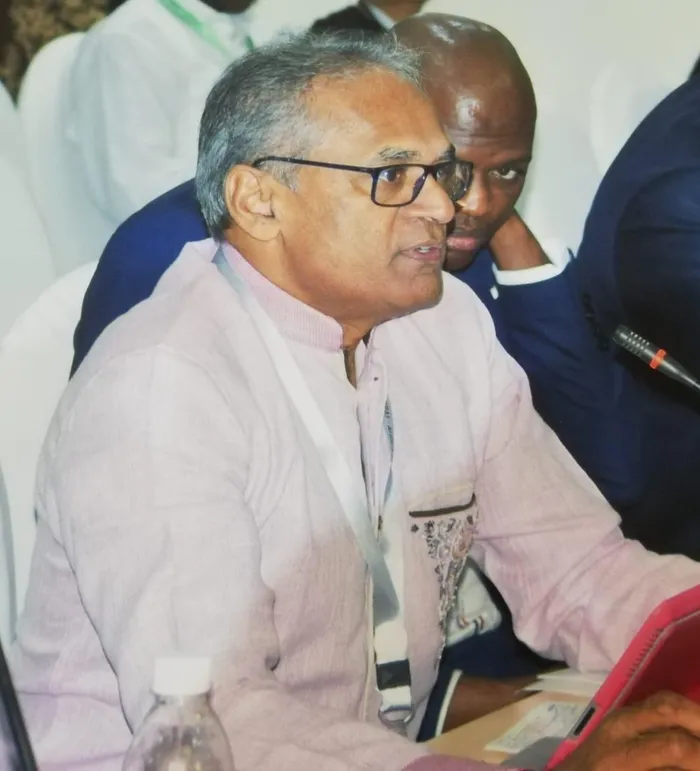
Govender, a member of the Inkatha Freedom Party, while serving as a Member of the Provincial Legislature in KwaZulu-Natal.
Image: Supplied
Career/further studies
Govender said while he hoped to pursue his studies in accountancy, he did not want to place a financial burden on his parents.
“I excelled in accounting at school and wanted to be an accountant. My father would have been able to make the means for my studies, but he was the only one working. It would have been difficult to take care of the basic needs in the home as well as the costs of my studies.”
His first job was as a sales representative for a company selling encyclopedias, which lasted a day.
“I went for two days of training. On the second day, we were dropped off in Overport that afternoon when people would be at home. I only got home after midnight and my mother was waiting for me. She was standing and looking out the window. When I went inside, she made me a cup of tea and said I would not go back, and I listened. My mother always waited for me to return home even as I got older.”
Shortly thereafter he got a job as a clerk at Crescent Ridge Primary School in Chatsworth.
During this time he met his former teacher, who encouraged him to further his education.
“He was teaching at the school where I was a clerk. He told me I could not be a school clerk all my life and I needed to study. At that time, I didn’t know where to apply or what I would study. He told me I should do a part-time Bachelor of Art degree at the University of South Africa (Unisa). I continued to work and studied part-time for three years. I completed my degree, majoring in English and history.
“During this time, I was also promoted to a Grade 1 clerk and was based at the Indian Affairs offices in Stanger Street, Durban. After a year, I was transferred, in the position as a Grade 1 clerk, to Southlands Secondary School in Chatsworth.”
He then completed a diploma in higher education part-time through Unisa.
“While at the school, the principal told me there was an upcoming vacancy for a librarian. He told me I should study and then apply for it. However, the course was only being offered full-time. Thankfully, I had accumulated enough leave and took two months unpaid leave to pursue my diploma in resource centre management at the then-University of Durban-Westville.
“I thereafter returned to school and was appointed as the librarian. During this time, the Department of Indian Education made a ruling that librarians must also teach. I taught English and history to pupils from grades 9 to 12.”
Govender said in the early 1990s, he decided to take a severance package.
“The Department of Indian Education had offered the packages, and many were taking it due to the lack of opportunities in respect of promotions. I remember looking at the teachers who would apply for a promotion, and it took a toll on them each time they did not get it. I didn’t want to go through that, so I decided to leave.
“This was done without any plans as to what I was going to do next. A friend, who was a wood and metal works teacher, approached me and said he built cupboards for a secondary income. He said I should join him. I told him I did not know anything about this, but he said he would teach me. He taught me how to do measurements and designs, and I soon began working. It was a lot of hard work, but a great experience,” he said.
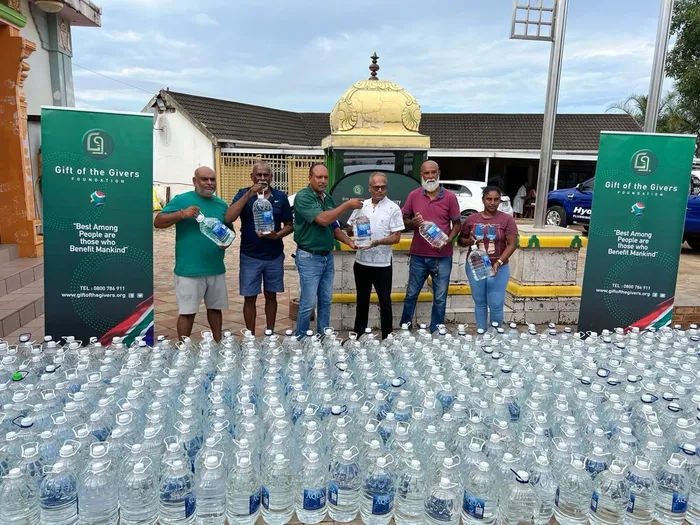
Govender, fourth from left, during a water donation with the Gift of the Givers.
Image: Supplied
Community service
Govender said his involvement in community service started while in matric.
“Matriculants, who were about two years ahead of me, started a group called ‘CHOPS’, which was the Chatsworth High Old Pupils Society. I began volunteering with them while still in matric. They fund-raised and the money was used for food hampers, to pay utility bills for people who were struggling, and later they provide bursaries for youth to further their education.
“We also had talented people in the group who held fundraising events such as plays for various welfare organisations as far as Umzinto and Ladysmith. Over the years, I served as the secretary, vice chairperson and public relations officer,” he said.
In the early 1990s, Govender joined the Child Welfare Chatsworth as a volunteer.
“Some of the members of CHOPS, who were also on the welfare’s board of management, asked me to join. When I wasn’t busy doing a job building cupboards, I volunteered at the welfare.”
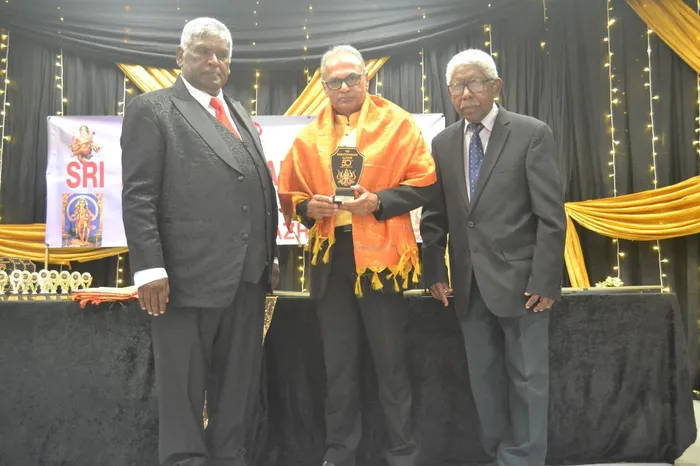
He received a token of appreciation from officials of Sri Kabaleesvarar Alayam in Chatsworth.
Image: Supplied
Tragic memory - Throb nightclub
On March 24, 2000, panic broke out after the detonation of a teargas canister at the Throb nightclub in Chatsworth. There were 600 children as young as 11 years old celebrating the end of school term. The incident resulted in the deaths of 13 children and left over a 100 injured.
Govender was in the welfare’s offices when the incident occurred.
“I remember the sounds of helicopters and police sirens. The office was a few hundred metres away from the nightclub. Together with other members, we spent hours trying to assist the children, getting them into ambulances so they could be taken to hospital. It was later that evening, as I was about to leave, when there was an announcement made on the police loudspeaker to go to the station.
“When I arrived, I was met by many prominent people such as Fatima Meer, Amichand Rajbansi and Narend Singh, as well as other leaders in Chatsworth. They were discussing how they could assist the families and wanted my input. However, the parents of all of the children that were involved in the incident had gathered at the station, so they asked if we could use the welfare’s boardroom.
“During this time, I also received calls from people, including businessmen, who wanted to donate. At first we didn’t want to do any collections of money, but they were persistent. We tried to open a bank account the next day, but we did not have success as there were many protocols. One of which, we needed to be a registered organisation and have a Constitution. So it was decided that the welfare’s bank account would be used. With all of the donations, we paid for the funerals and medical expenses for the injured children,” he said.
Govender said with funds leftover, a decision was taken to provide youth with bursaries.
“We called a community meeting and said we have this extra money, what should we do. A decision was taken that we would give bursaries in memory of the 13 children who passed away. We also formed the Chatsworth Community Youth Development Trust and have since given out about 30 bursaries.”
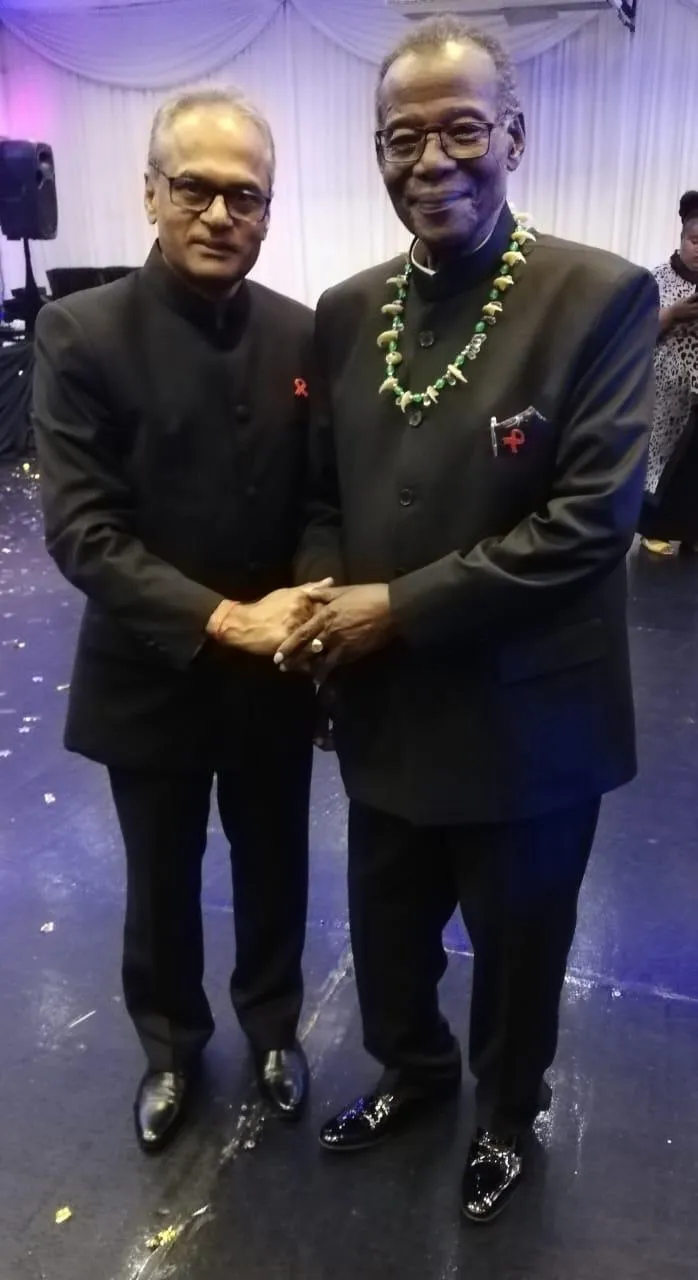
With the late founder and leader of the Inkatha Freedom Party, Prince Mangosuthu Buthelezi.
Image: Supplied
Politics
Govender was approached to join the Inkatha Freedom Party (IFP) in 2003.
“At the beginning of December, a friend approached me and said a local businessman wanted to meet me. When we met, he said he called me as he wanted me to go into politics. I was quite shocked because I was not affiliated with any political parties and I was just doing community work. So I asked ‘why me?’. He said the businessmen had been watching me for the past few years and had seen my commitment to serving the community. He also said they had spoken to the leadership of the IFP about me.
“I told him I would give him a response in the new year, and that I have to first speak to my family and friends. It just so happened that in December my friends and I planned a trip to a game reserve. On the second night, while having dinner at a restaurant, there was a sudden movement of tables. When I asked the waiter what was happening he said the premier was coming.
“The premier of KwaZulu-Natal at the time was the now late Dr Lionel Mtshali, who was a member of the IFP. When he walked in, he was shaking hands with everyone, so I thought let me check if the businessmen had really told the IFP leadership about me. When he stopped in front of me and stuck out his hand, I said ‘My name is Les, I am from Chatsworth’. He looked at me and said ‘Govender?’. I said yes, and he said we will talk later. When I got back home, I told the businessman, ‘I will join’,” he said.
Following the local government elections in 2004, Govender was appointed as a member of the Provincial Legislature (MPL) in KwaZulu-Natal, and served in various portfolios, including education and social development.
“My goal was to do more for the community. While I worked in the community, it was as a volunteer. I did not have access to where decisions were being made. However, as an MPL I was able to do more as I could talk to the people making the decisions.”
He served in the legislature from 2004 to 2009, and then again from 2011 until last year.
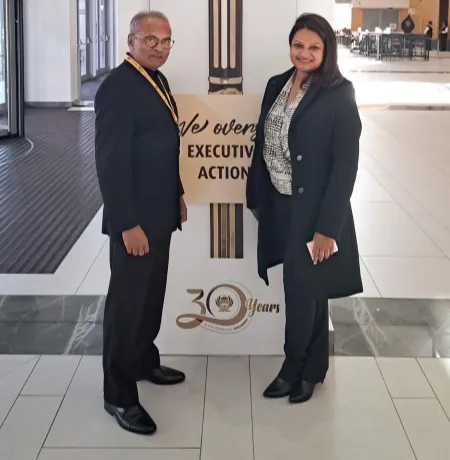
With his daughter, Anita Govender, at his swearing-in ceremony as the deputy chairperson of the National Council of Province.
Image: Supplied
Govender was appointed as the deputy chairperson of the NCOP in July last year.
“I still have to shake myself at times, as it feels unreal, especially when sitting among delegates from different parts of the world where I travel to speak at the various events. In this position I am able to make a greater difference, especially for the people of the country.
“Many don’t know the role of the NCOP, which is something I always share first when I am invited to speak at events in communities. I want citizens to know that the NCOP is accessible for whatever issue they have in respect of legislation. For example, a certain Act may have a clause that does not speak to a challenge they are experiencing. The community can write to the NCOP calling for the Act to be worded differently, so it can assist them. Our role is to then look at their suggestions through our legal teams, who will then advise if it can or cannot be amended. Citizens need to know they have a voice in the country.
“In addition, in instances where projects are meant to be done to uplift communities, we track the progress. If it is not completed in a set-out time, we will then call the minister or department before the NCOP to answer as to what happened with the project,” he said.
Over the past year, Govender has been speaker at various events, including the 11th G20 Parliamentary Speakers' Summit in Cape Town, the BRICS Forum in Brazil, the 151st IPU Assembly in Geneva, the 150th IPU Assembly in Uzbekistan, and the Kumbh Global Summit on Development and Sustainability in India.
He said he hoped to leave a legacy of having made a positive difference in communities.
Govender, who also received recognition both locally and internationally for his contributions towards the upliftment of communities, said he hoped to leave a legacy where he was remembered for the positive impact he made in the lives of others.
Family
Govender has two children, Niki Govender, 48, and Anita Govender, 42, and a grandson.
Relaxation
To relax, he enjoys reading suspense novels and biographies, as well as doing crossword puzzles.
Related Topics: